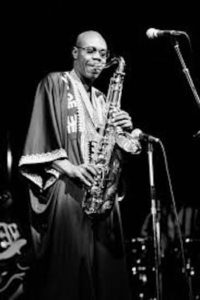
Manu Dibango
*Manu Dibango was born on this date in 1933. He was a Black African musician and songwriter.
Emmanuel "Manu" Dibango was born in Douala, Cameroon. His father, Michel Manfred N'Djoké Dibango, was a civil servant and son of a farmer; he met his wife traveling by pirogue to her residence in Douala. Emmanuel's mother was a fashion designer running her own small business. Her ethnic group, the Douala, and his, the Yabassi, viewed this union of different ethnic groups with criticism.
Dibango had a stepbrother from his father's previous marriage who was four years older than him. In Cameroon, one's ethnicity is dictated by one's father. However, in his autobiography, Three Kilos of Coffee, Dibango wrote that he had "never been able to identify completely with either of [his] parents." Dibango's uncle was the leader of his extended family. Dibango's father refused to take over upon his death, as he never fully initiated his son into the Yabassi's customs.
Throughout childhood, Dibango slowly forgot the Yabassi language in favor of Douala. However, his family did live in the Yabassi encampment on the Yabassi plateau, close to the Wouri River in central Douala. While a child, Dibango attended Protestant church every night for religious education or nkouaida. He enjoyed studying music there and reportedly was a fast learner. In 1941, after being educated at his village school, Dibango was accepted into a colonial school where he learned French. He admired the teacher as "an extraordinary draftsman and painter." In 1944, French President Charles de Gaulle chose this school to perform the welcoming ceremonies upon his arrival in Cameroon.
In 1949, at age 15, Dibango was sent to college in Saint-Calais, France. After that, he attended the lycée de Chartres, where he learned the piano. He was a member of the seminal Congolese rumba group African Jazz and has collaborated with many other musicians, including Fania All-Stars, Fela Kuti, Herbie Hancock, Bill Laswell, Bernie Worrell, Ladysmith Black Mambazo, King Sunny Adé, Don Cherry, and Sly and Robbie. He achieved a considerable following in the UK with a disco hit called "Big Blow," originally released in 1976 and re-mixed as a 12" single in 1978 on Island Records. In 1998, he recorded the album CubAfrica with Cuban artist Eliades Ochoa.
At the 16th Annual Grammy Awards in 1974, he was nominated for Best R&B Instrumental Performance and Best Instrumental Composition for "Soul Makossa." In 1982, Michael Jackson used the "Ma ma-se, ma ma-sa, ma ma-kossa" hook from Dibango's 1972 single "Soul Makossa" without his permission and without credit for the song "Wanna Be Startin' Somethin.'" When Dibango found out, Jackson quickly admitted that he borrowed the line. The matter was settled out of court. The song "Soul Makossa" on the record of the same name contains the lyrics "makossa," which means "(I) dance" in his native tongue, the Cameroonian language Duala.
He served as the first chairman of the Cameroon Music Corporation, with a high profile in disputes about artists' royalties. Dibango was appointed a UNESCO Artist for Peace in 2004. In August 2009, he played the closing concert at the revived Brecon Jazz Festival. In 2007, Rihanna sampled the same hook from Jackson's song for her "Don't Stop the Music" track and did not credit Dibango. When Rihanna had asked Jackson for permission to sample the line, he allegedly approved the request without contacting Dibango beforehand. In 2009, Dibango sued both singers. Dibango's attorneys brought the case before a court in Paris, demanding 500,000 damages and asking Sony BMG, EMI, and Warner Music to be "barred from receiving 'mama-se mama-sa'-related income until the matter is resolved."
The judge ruled that Dibango's claim was inadmissible: a year earlier, a different Paris-area judge had required Universal Music to include Dibango's name in the liner notes of future French releases of "Don't Stop the Music" and, at the time of this earlier court appearance, Dibango had withdrawn legal action, thereby waiving his right to seek further damages. In July 2014, he made an 80th-anniversary concert at Olympia, France. In September 2015, Michaëlle Jean, Secretary General of the Organization Internationale de la Francophonie, honored Dibango with the title of Grand Témoin de la Francophonie aux Jeux Olympiques et Paralympics de Rio 2016 (Special Representative of Francophonie to the Rio 2016 Olympic and Paralympic Games). Manu Dibango died from COVID-19 on March 24, 2020 in Paris.